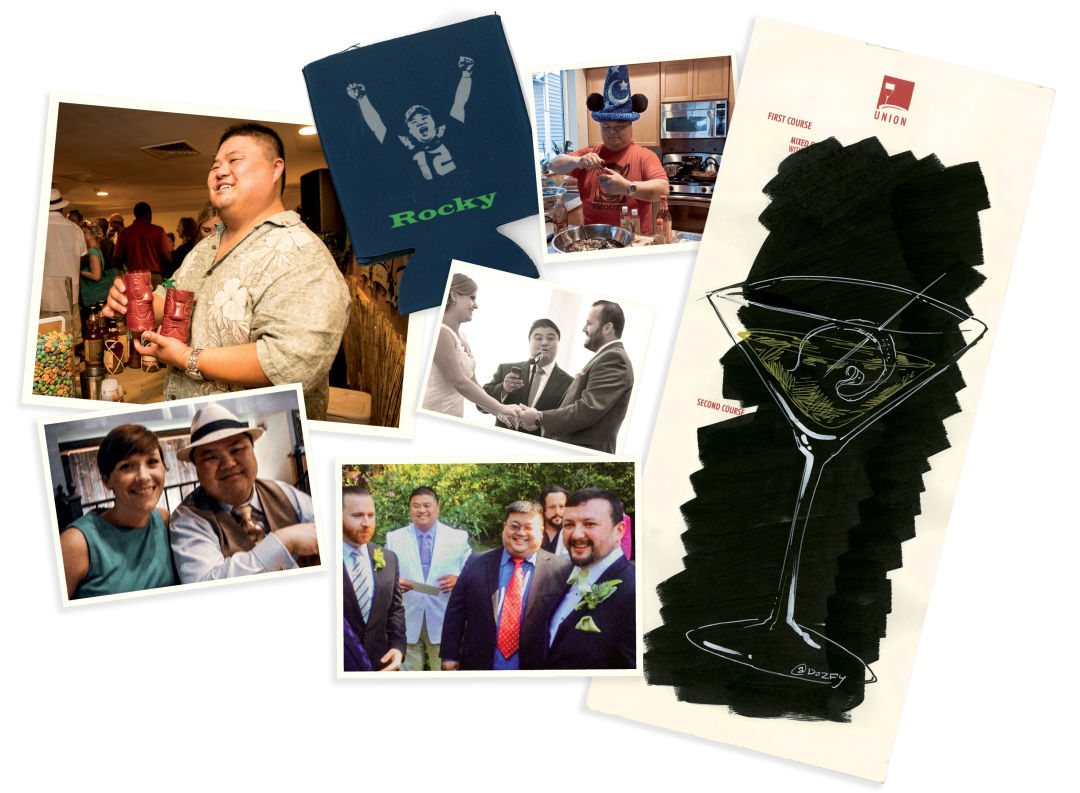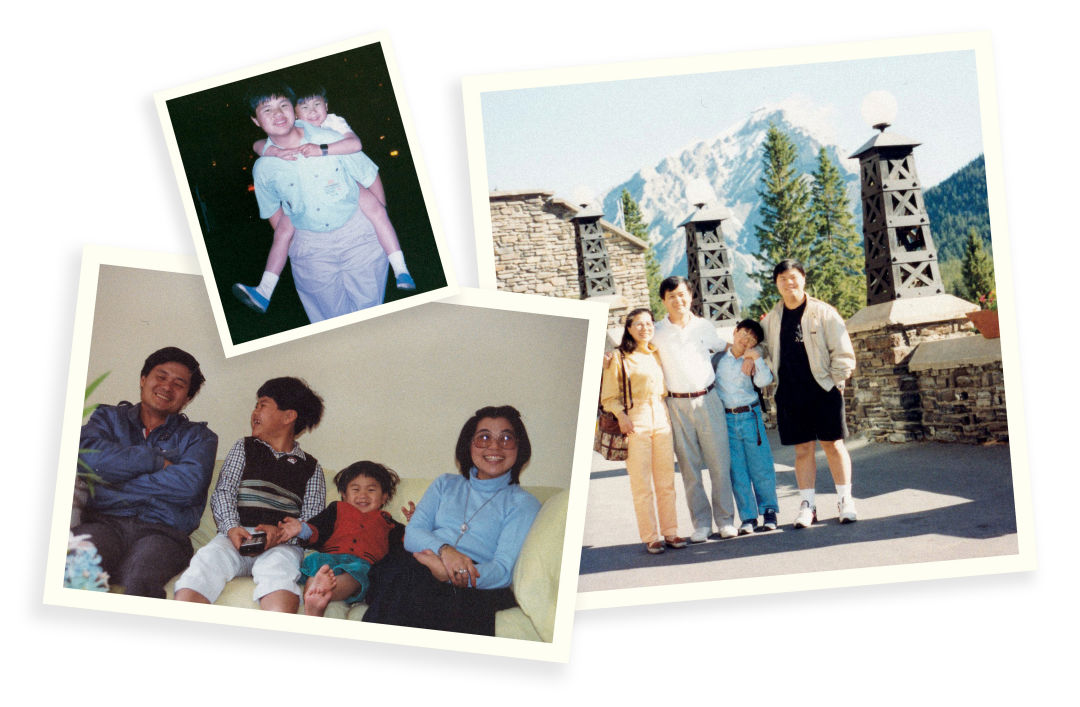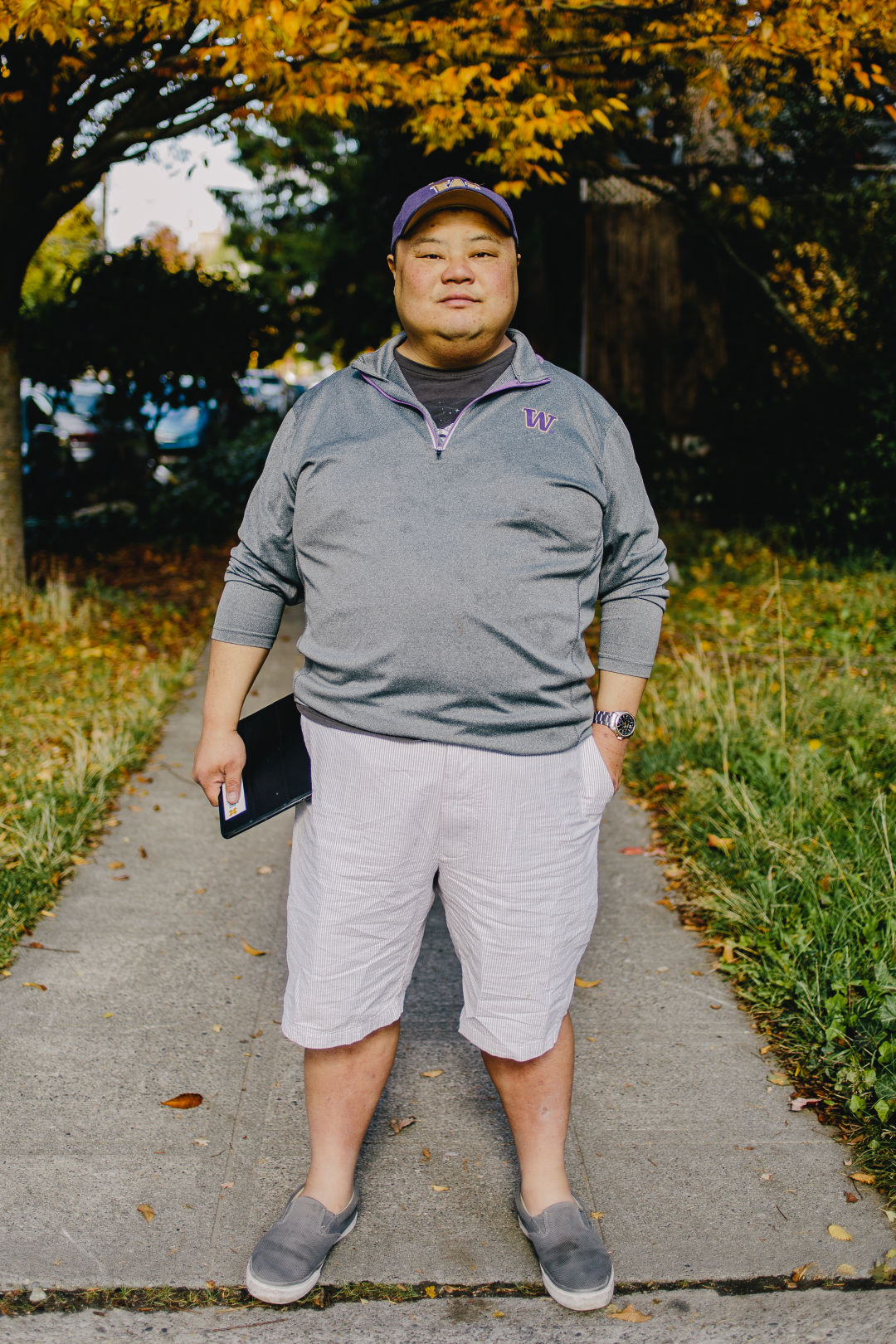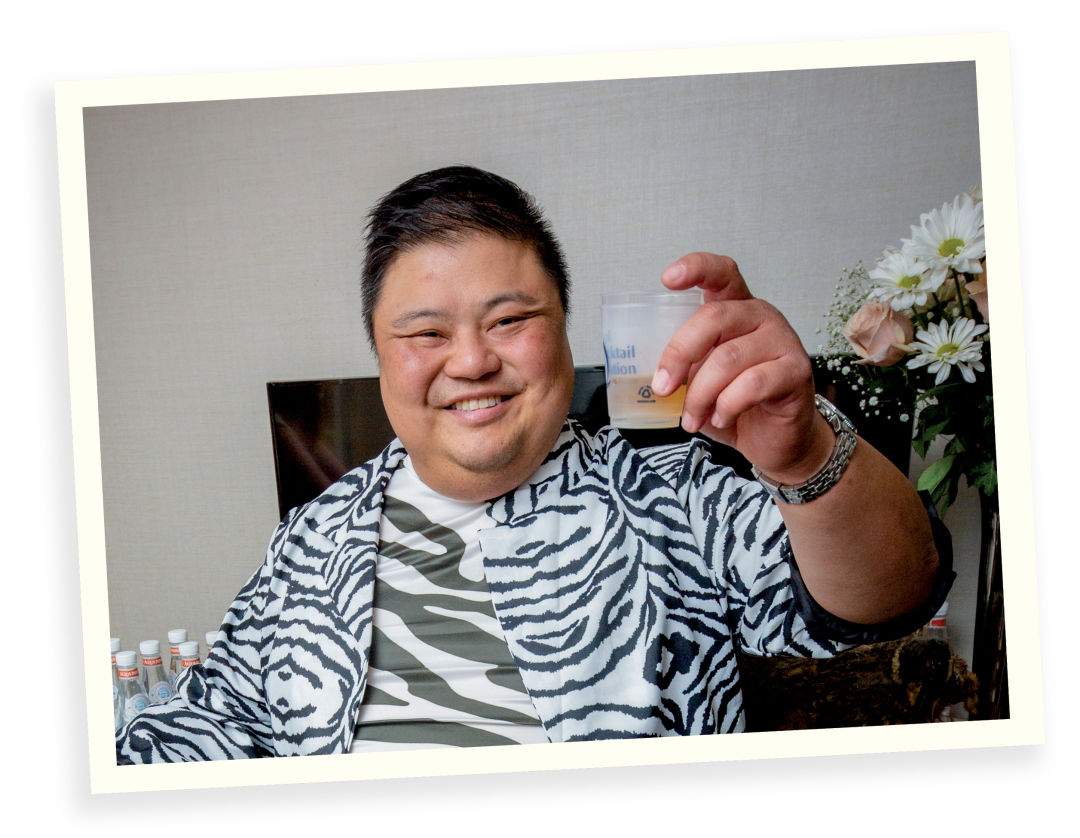The memorial was gutting, but it was also one hell of a party.
Restaurateur Ethan Stowell secured the event space, a converted warehouse in SoDo. Organizers shelved initial plans for a bouncy castle, something best enjoyed in forgiving waistbands: Rocky Yeh would have demanded any celebration of his singularly expansive life be a dressy affair. He also definitely would have demanded the hot dog stand, the jamon iberico carving station, and the photo booth. Not to mention the table stacked with his preferred late-night booze antidote, Cup Noodles—and the ice luge shaped like the carton of instant ramen.
Bartenders from Rocky’s favorite Seattle cocktail destinations shook drinks, and three tattoo artists stayed nearly as busy. Maybe 50 people left the service with new ink: a dumpling with wings; a set of Mickey Mouse ears that said “Rocky.” Jenn Tosatto, a bar manager from Kansas City, opted for one of her beloved friend’s signature phrases, “Order the whole menu,” on her inside right arm.
The crowd surged above 550 people, including bartenders who flew in from Florida, New York, even London. Some wore enamel pins that depicted Rocky in white, complete with wings and halo, arms upraised. He sports the same exuberant stance on the night’s commemorative koozies, except he’s wearing a Seahawks jersey, celebrating a perpetual win any time someone cracks open a cold beer.

“Rocky had FOMO more than anybody else,” recalls Jim Romdall, one of a group of close friends who organized this soiree. Their goal: A bash so spectacular, its honoree would look down from the heavens and rue his untimely departure as much as his assembled guests did.
Rocky Chien Wen Yeh was just 42 years old when he collapsed from heart failure inside his University District townhouse on December 1, 2019. A connector extraordinaire with deep reserves of empathy and humor, he spent his first decade of adulthood trying to reconcile himself to the sort of career his upbringing had templated for him. Instead, he found his spiritual home in the cocktail world, becoming the link between producers and practitioners of high-end liquor. In recent years, he crisscrossed the country and traveled far beyond it on behalf of the French company Maison Ferrand.
Stories about Rocky flow faster than shots of pineapple rum. There were the costume-driven Husky football bets, and an annual celebration dubbed Goutmas: a two-day feast for members of Seattle’s hospitality industry too slammed to make it home for the holidays. When Rocky famously ordered every item on a restaurant’s menu, he would drop excess food off to friends working busy shifts at a nearby bar, often en route to his second or third dinner of the night.
Friends going through hard times recall grand gestures, like the time Rocky suggested a burger run…to In-N-Out in California. But he also overperformed in joyful moments. Jon Krier, a longtime friend, recounts how Rocky was not only the best man in his first wedding—he also catered the reception, helped Krier’s then-fiancee pick out her wedding dress; when she found a dream gown out of her price range, he picked up the tab as a gift. At a different wedding, Rocky showed up with a super soaker full of negronis.
For a guy who loomed large in the cocktail world, Rocky’s name doesn’t reverberate much with lay drinkers. However, his influence quietly pervades many of the best bars in America, where patrons (at least pre-Covid) might explore cask-aged rums, the kind you sip rather than chug on spring break. Or perhaps geek out on a tiki cocktail, as colorful and carefully assembled as Rocky’s vast collection of Hawaiian shirts.
Nothing about Rocky’s upbringing—first in California, then in Washington’s Tri-Cities—suggested he’d find a trajectory in nightlife. But then, cocktails have a way of attracting people with curious minds, life enthusiasts with too much brio to sit behind a desk. Even if that’s what’s expected of them.
In 2003, Ethan Stowell wasn’t yet a prolific restaurateur, but an ambitious 29-year-old whose new restaurant, Union, injected Seattle’s restaurant landscape with unfamiliar kinetic bravado. Rocky’s IT job left him plenty of mental energy to pour into the online culinary forum eGullet. Here, his appetite for great food and love of considered discussion took hold. Under the handle Rockdoggydog, he traded endless restaurant assessments among a community of similarly obsessed Seattle diners, most of whom loved Union as much as he did.
In the restaurant’s heyday, Stowell estimates Rocky came in maybe five nights a week. A kitchen full of hypercreative cooks, many of whom would go on to define our next wave of dining, embraced the challenge of crafting off-menu meals for superusers like the eGullet crew. “It was our playground there,” remembers Traca Savadogo, a fellow eGullet diner. Eventually Rocky even felt comfortable slipping into the kitchen and sticking around for after-hours staff karaoke.
At first, he focused more on food than on Union’s L-shaped bar, where Keith Waldbauer was pushing the cocktail program to reflect a renaissance happening across the country. But his classic drinks drew Rocky in. Soon he was just hanging out at the bar, absorbing every possible piece of information about what went on there.
Union opened the same year Seattle bar legend Murray Stenson dusted off the recipe for a Last Word cocktail and trained a national spotlight on Zig Zag Cafe, a small spot on the Pike Hillclimb. Rocky and Waldbauer bedrocked their friendship over evenings spent exploring the movement taking hold behind a very few Seattle bars. “If you went to Zig Zag in those early days,” recalls Waldbauer, “you would have seen the entire bar top ringed by bartenders with notebooks.”
Back at Union he created a drink in Rocky’s honor and enshrined it on the cocktail list. Rum wasn’t yet Rocky’s signature, so the Yeh, Yeh, Yeh packed two and a half ounces of Woodford Reserve bourbon, smoothed over by blanc and rouge Lillet. Rocky liked to order it as the Me, Me, Me.
He wanted to learn more about this world. “That’s all he ever did in life was learn stuff,” Jim Romdall recalls. By 2007, Romdall worked at Vessel, a slip of a space on Fifth Avenue that bolstered Seattle’s national cocktail cred. Rocky asked, Can I be your barback on Monday nights? You don’t have to pay me. He was the best-dressed guy in Seattle running drinks and bussing tables. Rocky carried business cards that simply said “bon vivant,” and in 2008, flew to New Orleans for his first Tales of the Cocktail, the annual industry gathering. It wasn’t yet the weeklong combo of bacchanalia and sponsorship-drenched seminars it’s become, but it was a convergence of the craft cocktail vanguard from across the country. During that blurry romp of days (and even blurrier nights), Rocky’s consciousness expanded: Cocktails could be more than a thing he loved. They could be his whole life.
He talked about medical school, a career he knew would bring his mom and dad a lot of pride, but did so with dwindling enthusiasm. Working in IT at a medical research arm of a university was still a job parents could understand. Growing up so far outside the spirits world, Rocky’s younger brother Ryan remembers, his family understood it as “the seedy underbelly of culture—the mafia and the yakuza.” Rocky spent another year balancing both his day and night personas but by next year’s Tales, he knew for sure. He was going to quit his day job.

Ryan Yeh was all of 10 years old, minding his own business, reading a book in the family’s basement, when his older brother Rocky barged in to interrupt. Typical big brother stuff, except most don’t bring along an armful of Shakespeare’s Globe plays. As Ryan remembers it, Rocky dropped books in his lap and told him to finish Hamlet by tomorrow. “If you don’t, I’m gonna beat your ass.” Ryan invariably completed these impromptu assignments; after all, his brother had six years and plenty more pounds on him. “He had a perverse delight in making sure I was well-read.”
Rocky was just one year old when he emigrated from Taiwan with his parents in 1978. Though his given name was Chien Wen, he always said he picked his American name after watching The Adventures of Rocky and Bullwinkle cartoons that played in various airport gates and lounges during the trip. He liked the flying squirrel; he pushed his new moniker until his mom and dad relented.
The Yehs lived in California, in the Orange County town of Tustin. When he was six, he became a big brother to Ryan. Growing up, Rocky absorbed his dad’s love of planes and his mom’s ardor for musicals. Both boys took full advantage of living 20 minutes from Disneyland. Even as an adult, the theme park hovered near the top of a seemingly endless roster of passions—trains, history, sports, video games, documentaries, haberdashery.
When Rocky was a teenager, his father, who had worked in avionics, got a new job in the economic ecosystem that surrounds the former Hanford nuclear site. The family moved to Richland, then a town of 33,000, in Washington’s agricultural southeastern corner. Transferring in the middle of high school wasn’t easy, Rocky’s friend Christine Rodgers remembers. Making people like him was his coping mechanism. “Instead of being shy, he chose to be outgoing.”
At Richland High School, Rocky played violin in the orchestra and spent lunch hours engrossed in Magic the Gathering with fellow fans in an empty classroom. Even as a teen, he abhorred busy work, balancing a lackluster GPA with top-level standardized test scores. He wanted to be liked, recalls Rodgers, and wanted people to like him. Back then, says his brother, “You could see the prototype version of Rocky.”
The true expression of him emerged at the University of Washington (Husky fandom would become one of his defining qualities). Forever industrious, Rocky took Running Start classes back in Richland to stockpile college credits even before he arrived on campus.

He loved Seattle instantly. “I’ve never lived anywhere else that screams ‘this is my place’ more,” he would say in an interview nearly a decade later. Rocky had planned to complete a combined MD/PhD program, but one youthful move as an undergrad derailed those intentions.
Rocky had left the dorms for a student apartment. As his brother tells it, running down a flight of stairs and around a corner to check his laundry seemed less efficient than simply leaning over this second-floor balcony to try and peer into the laundry room window below. He overbalanced and fell to the ground face-first.
“One of his eyes was basically crippled after that,” says Ryan Yeh. Rocky eventually did pursue that demanding graduate coursework, but when he got to the surgical part of his training, his lack of depth perception meant he struggled to perform procedures quickly enough.
He shifted from one STEM profession to another and took a job in IT for the University of Washington gastroenterology department. Later, Christine Rodgers, his high school classmate, ended up working in the same building. She remembers her friend whiling away the days in a basement office filled with servers. “But Rocky lived to be around people.”
Today, Erik Trickett can’t even remember what city he was in when he spotted the telltale rum. He’d been flying all over, doing cocktail events as a brand rep, and found himself in a small Midwestern airport (Omaha? Iowa?) with an hour layover to kill. He plunked himself down at an airport bar between his two gates. That’s when he noticed something out of the ordinary: some extravagant bottles from the brand known as Plantation Rum lined up on the back bar. (This summer, its parent company, Maison Ferrand, announced it will rename its line of Caribbean cane-based spirits since “Plantation” carries some problematic connotations.)
Encountering impressive spirits of any kind at an airport bar is not normal, Trickett explains. “Let alone seeing really fantastic expressions of those spirits.” Not only that, the bartender spoke pretty knowledgeably when Trickett inquired about them. He was floored—“I’ve been to rum bars where the bartender wasn’t familiar with these.”
A lightbulb went off for Trickett, concerning a fellow road warrior. He asked the man pouring his drink, “Do you happen to know a guy named Rocky?”
The bartender looked over his shoulder. “Rocky Yeh? Oh yeah!”
When Rocky leapt into the spirits world, he briefly considered owning a bar, but his love of both company and excess pointed him toward a life on the road repping brands. Eventually he scored a job with Maison Ferrand, the Cognac house turned rum producer. He spent more nights away than he did at home, hitting up festivals and tiki gatherings and big-city cocktail meccas. But even in this airport, says Trickett, “he was going to make sure that this kid with zero training was falling in love with rum.”
Rocky’s friend Jabriel Donohue was also a brand rep at the time and recalls texting his friend only to learn the two Seattleites both happened to be in New York (or San Francisco, or Portland) that day. Alighting in city after city, Rocky built an extended family among the bar community and reinforced those relationships with a steady stream of happy birthday texts, big dinners, and heartfelt, if unsolicited, opinions about big life choices offered over drinks. In this mode, the many facets of his personality coalesced.
His job was to travel, gather people together and foster great times, the sort that promoted the particular spirits in his portfolio. As Donohue puts it, “Rocky didn’t have to do anything to be a brand ambassador. He just had to be Rocky.” Maison Ferrand gave Rocky an unusual level of freedom, and an unusual dual role that straddled sales and evangelism. The perfect setup for a consummate multitasker and innate host repelled by busy work and middle management.
“A lot of times, you get these people who work for a brand, and they’re all about the brand,” says Jenn Tosatto, the bar manager who went home to Kansas City after Rocky’s memorial with a new tattoo. Thanks to Rocky’s travels, the people he counted as friends numbered, literally, in the thousands.
Rocky never officially worked behind the stick, but he intuited the essence of hospitality—that people need to be seen and cared for. That the art of tending bar differs from the act of mixing drinks.
Nearly a year later, friends still tag Rocky on Facebook with regularity, as they eat dumplings that would meet with his approval, or when social media algorithms churn up photos of bygone shenanigans. Keith Waldbauer reminds himself to check in on friends, the way Rocky always did. In Maison Ferrand staff meetings, someone will invariably pipe up to ask, “What would Rocky think of this?” During the shutdown, Traca Savadogo channeled her friend who taught her so much in the Union days as she ordered 14 bouquets from a Pike Place Market flower vendor, and sent them to various friends, each with a handwritten note. “He was a king of creating magical moments like that.”

Jabriel Donohue was the one who found Rocky in his townhouse the night after he died. The medical examiner would later cite heart failure, a “natural cause” of a life in overdrive. Donohue, Waldbauer, and Jim Romdall were among a very few friends who attended the family’s small ceremony, along with relatives from Taiwan and Japan and California. But Rocky’s inner circle knew his bartending family would need a remembrance of their own. Maison Ferrand donated a budget, and booze, for that bash in SoDo. At the behest of the group, Ryan Yeh asked his parents if they would like to be there; Tim and Helen Yeh said yes, and booked a flight across the Cascades from Richland.
The night had no formal program, no remarks until the end, when Rocky’s father took the mic. The ’90s rap and happy conversation, the clatter of ice in shakers—everything fell silent. The guests almost unconsciously formed a ring around the bespectacled gray-haired engineer in a black suit. Rocky’s mother stood next to him, two grieving parents in dress clothes, encircled by full-hearted proof of their elder son’s legacy.
Tim Yeh thanked these hundreds of people for welcoming his son into their lives. The crowd responded with emotional applause. Then Spotify kicked back in with a song chosen at random from the night’s playlist: “When You Wish Upon a Star.”
Rocky himself couldn’t have planned it better.
"craft" - Google News
November 21, 2020 at 12:00AM
https://ift.tt/36TvLDh
Seattle's Rocky Yeh Helped Craft America's Cocktail Landscape - seattlemet.com
"craft" - Google News
https://ift.tt/2YrY2MS
Shoes Man Tutorial
Pos News Update
Meme Update
Korean Entertainment News
Japan News Update
Bagikan Berita Ini















0 Response to "Seattle's Rocky Yeh Helped Craft America's Cocktail Landscape - seattlemet.com"
Post a Comment